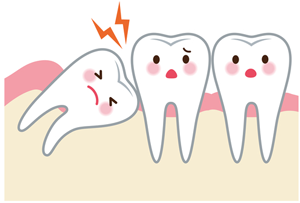It happens to everyone. There is not a single person alive who could honestly say they have never had bad breath or a bad taste in their mouths that they just couldn’t get rid of. For most people it passes within a few hours and they go about the rest of their day not really giving it much thought. For others, though, the issue may be repetitive or last longer. In those cases, there are several reasons that may contribute to the problem of halitosis, or bad breath. Let’s take a look at some of those reasons now.
- Infection: Typically the most common cause of bad breath is an infection somewhere. Some people refer to this type of halitosis as “sick breath”. Sinus and upper respiratory infections can both cause it as nasal drippings, phlegm and bacteria drain and build up in the mouth. Other sources of infection like an infected cavity, an infection in the gum or jawbone or an abscess may also cause foul breath. Oral infections may not hurt at first and pain is generally what people think of when they think of infections. That means an oral infection may be allowed to fester for some time before treatment is sought or before the patient even knows anything may be wrong. Unfortunately, that means the bacteria has more time to work its way into the bloodstream and potentially cause damage to other organs like the heart. In fact, oral health and hygiene has been directly linked to heart health, diabetes and even risk of stroke. If your mouth tastes “tinny”, “bitter”, “sour”, “metallic” or otherwise strange you may want to have a doctor take a look.
- Tonsil Stones: If you still have your tonsils, there is a chance you may get something called tonsil stones or tonsilloliths. They happen when debris gets caught in the small nooks of the tonsils and bacteria builds up around them. Sometimes people cough or sneeze them out or they dislodge on their own. They are small, white or off-white and very foul smelling. Generally they do not require surgical intervention and can be removed gently using q-tips or other soft implements. It is best to have your dentist remove them, especially if you have a strong gag-reflex.
- Deteriorating Fillings: If the taste or smell is almost metallic and you have fillings, it may be time for you to have those fillings checked. If a filling is deteriorating, infection may be able to creep in around the edges and cause further damage to the tooth as well as the surrounding tissue. If caught early, the filling may be able to simply be replaced. If left longer, more work may need to be done.
- Gastrointestinal Problems: Stomach gasses and acids can often cause a type of bad breath that cannot be fixed by brushing, flossing or mouthwash. That’s because the source of the odor doesn’t lie in the mouth at all. If you have acid reflux, heartburn, irritable bowels, Crohns disease, ulcers or other stomach and digestive problems then this type of halitosis might be the type most likely to affect you. If you find that you suffer from bad breath regardless of how often you brush, floss or use mouthwash then you may wish to consult with a doctor and see if there may be an underlying gastrointestinal or digestive problem.




